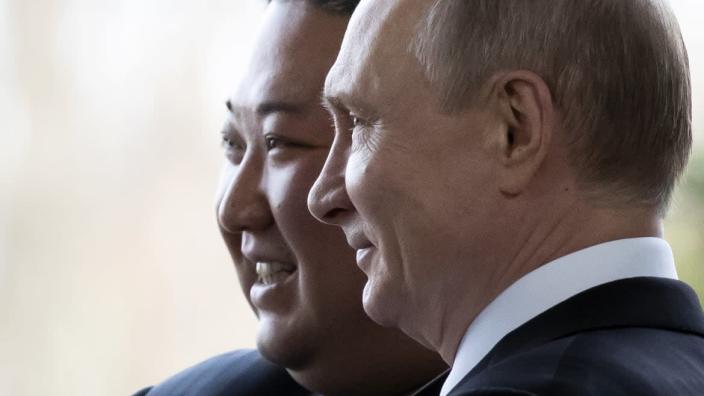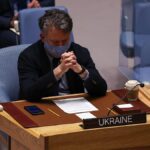
SEOUL—Vladimir Putin has a soulmate in Pyongyang in the form of North Korea’s leader Kim Jong Un.
Hours before Putin ordered his nuclear forces to go on high alert, North Korea put out an analysis showing the parallel between Putin’s fears and Kim’s need for nukes and missiles in the face of demands by the U.S. and its allies for denuclearization.
“The greatest danger the world is now faced with is high-handedness and arbitrariness of the United States and its vassal forces that are shaking international peace and stability at the basis,” the commentary, issued by the North Korean foreign ministry, read.
Kim Jong Un Is Ready to Exploit U.S. Distraction in Ukraine
While Putin accused western countries of “unfriendly actions” that called for a “special regime of combat duty”—meaning preparations for nuclear warfare—North Korea said “the United States and its vassal forces” were to blame for all of the world’s problems, including the crisis in Ukraine.
The commentary was the first response from Kim’s regime to the Russian invasion of Ukraine, and it showed how Kim shares common cause with Russia against the U.S. and other countries. While Russian forces rampaged through Ukraine, Kim has seemed just as willing to risk mass killing on the Korean peninsula.
It was as though Putin had been on the line with Kim talking about the need for nuclear defenses against all the bullies who both believe are ganging up on them. It’s not reported they talked, but their governments clearly agree on the importance of a nuclear deterrent against a common foe, the U.S.
Just to prove his point, Kim ordered another missile test Sunday—his eighth this year but his first since the Beijing Olympics. After conducting seven missile tests in January, North Korea held off on tests during the Olympics at the request of China, which didn’t want them to distract from the glory of the games.
North Korea’s response to the invasion put the North in lockstep with China, where a foreign ministry official accused the U.S. of “fanning the flame” and asked, “How do they want to put out the fire?” China, North Korea’s steadfast ally, and the source of all its oil and half its food, showed its solidarity with Russia by abstaining from a UN Security Council resolution condemning the invasion after Russia vetoed it.
People watch a television screen showing a news broadcast with file footage of a North Korean missile test, at a railway station in Seoul on February 27, 2022, after North Korea fired an "unidentified projectile" according to the South’s military.
” data-src=”https://s.yimg.com/ny/api/res/1.2/MGBqc0t6Sh9yWWOpjvTpTQ–/YXBwaWQ9aGlnaGxhbmRlcjt3PTcwNTtoPTQ4NA–/https://s.yimg.com/uu/api/res/1.2/.0T.SL3Txh8cyq2rLvuxdA–~B/aD04MDQ7dz0xMTcwO2FwcGlkPXl0YWNoeW9u/https://media.zenfs.com/en/thedailybeast.com/cea0f954fc1175ce391d110538018c5b”><img alt="
People watch a television screen showing a news broadcast with file footage of a North Korean missile test, at a railway station in Seoul on February 27, 2022, after North Korea fired an "unidentified projectile" according to the South’s military.
” src=”https://s.yimg.com/ny/api/res/1.2/MGBqc0t6Sh9yWWOpjvTpTQ–/YXBwaWQ9aGlnaGxhbmRlcjt3PTcwNTtoPTQ4NA–/https://s.yimg.com/uu/api/res/1.2/.0T.SL3Txh8cyq2rLvuxdA–~B/aD04MDQ7dz0xMTcwO2FwcGlkPXl0YWNoeW9u/https://media.zenfs.com/en/thedailybeast.com/cea0f954fc1175ce391d110538018c5b” class=”caas-img”>
People watch a television screen showing a news broadcast with file footage of a North Korean missile test, at a railway station in Seoul on February 27, 2022, after North Korea fired an “unidentified projectile” according to the South’s military.
JUNG YEON-JE/AFP via Getty Images
The message of the North Korean commentary, though, was far more disturbing, considering the North has reportedly gone on fabricating nuclear warheads since its last nuclear test in September 2017. North Korea is estimated now to have about 60 nukes at its nuclear complex at Yongbyon, about 60 miles north of Pyongyang.
Attributed to a researcher in the North’s Society for International Politics Study, the commentary also reflected North Korea’s anxiety about sanctions placed by the U.S. and UN in the wake of dozens of missile tests and six nuclear tests, four of them since Kim Jong Un took power after the death of his father, Kim Jong Il, in December 2011. The U.S. had “held on solely to the unilateral sanction and pressure” against Russia, said the commentary, a reminder of sanctions against the North.
In line with frequent denunciations of U.S. policy on Korea, the commentary said “the root cause of the Ukrainian crisis” was “the high-handedness and arbitrariness of the U.S.” In an echo of North Korea’s oft-stated rationale for the need for nuclear weapons, the commentary accused the U.S. of “pursuing only global hegemony and military supremacy in disregard of the legitimate demand of Russia for its security.”
The language of the commentary appeared as a cynical attempt to justify more missile tests, possibly of an intercontinental ballistic missile capable of reaching the U.S., and even perhaps a seventh underground nuclear test.
North Korea last tested an ICBM in November 2017 and is believed to be preparing to test another ICBM. The test Sunday was fairly commonplace, that of a short-range missile that flew 185 miles before landing off the east coast, but the North’s last previous test on January 30 was that of an intermediate-range hypersonic missile with a maximum range of nearly 2,800 miles.
Resumption of North Korean missile testing is deeply worrisome to the government of President Moon Jae-in, who has failed in attempts at reconciliation and dialogue with North Korea. Koreans next Wednesday vote for a new president in a campaign in which the candidate of Moon’s ruling Minjoo or Democratic Party, Lee Jae-myung, has pledged to pursue reconciliation. He faces a conservative, Yoon Suk-yeol, who avidly supports U.S. demands for denuclearization as a condition for any deal with the North.
How a Renegade Gymnast Strolled Into North Korea Like It Was No Big Deal
Moon, anxious not to offend either Russia or China, while deploring what’s happening in Ukraine, has not mentioned Putin by name. Nor has he described the Russian invasion as an assault on democracy.
The North Korean missile test, along with the commentary, also appeared as a warning to South Korean voters of the dangers of pursuing a hard line.
Mostly, though, it was a reminder of Russia’s support for North Korea dating from the Soviet era when the Soviet Union installed Kim Jong Un’s grandfather, Kim Il Sung, as the first ruler of North Korea after the Japanese surrender and the division of the Korean peninsula in 1945. Chinese troops drove U.S. and South Korean forces out of the North in the Korean War while Russia provided vital air support and heavy weaponry – all of which the North would need again in a second Korean War.
Get the Daily Beast’s biggest scoops and scandals delivered right to your inbox. Sign up now.
Stay informed and gain unlimited access to the Daily Beast’s unmatched reporting. Subscribe now.




